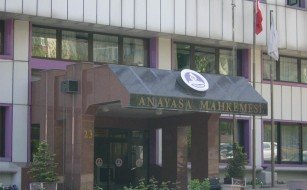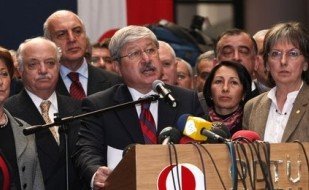Tugluk and Ata Still on Trial
Aysel Tugluk and Ayla Akad Ata are both MPs for the pro-Kurdish Democratic Society Party (DTP), in Diyarbakir and Batman respectively.
Despite their status as MPs, the Istanbul 9th Heavy Penal Court has decided to continue their trials, based on its interpretation of Article 14 of the Constitution.
Defense lawyer Özcan Kilic says that this article allows certain rights to be suspended under certain circumstances, and that the different interpretation of the law is due to the political nature of the trials.
"No room for interpretation in penal law"
He described the legal regulations of an MP's immunity and why the trials are being continued:
"This article, which is related to the country's integrity and security, has been used as an excuse to argue that immunity does not apply to these MPs, but that is a bad interpretation. Particularly in penal law, no decision can be made based on interpretation. In this case the attitude of parliament is important."
According to Kilic, it was the duty of parliament to say, "These people are protected by immunity, we will not permit a trial", or otherwise begin the process of lifting immunity.
"As soon as MPs receive their confirmation of office, their immunity begins. These MPs have also got immunity and at the moment it has not been lifted. The courts are maintaining an attitude of 'The immunity must be lifted'."
Case history
Tugluk and Ata have both been on trial at the 9th Penal Court for their statements and texts written about Abdullah Öcalan at the time of his trial. They have been accused of "spreading propaganda of an illegal organisation" and "aiding and abetting".
The immunity of Sebahat Tuncel, elected as an MP to Istanbul's third constituency, is also under discussion. Together with singer Ibrahim Rohhilat, Tuncel is being tried at the 10th Penal Court under Article 5 of the Anti-Terror Law (which is Law 314 in the Penal Code). The case will be heard on 11 October.
What does the Constitution say?
Article 83: "Members of the Turkish Grand National Assembly shall not be liable for their votes and statements concerning parliamentary functions, for the views they express before the Assembly, or unless hte Assembly decides otherwise on the proposla of the Bureau for that sitting, for repeating or revealing these outside the Assembly.
A deputy who is alleged to have committed an offence before or after election, shall not be arrested, interrogated, detained or tried unless the Assembly decides otherwise.
This provision shall not apply in cases where a member is caught in the act of committing a crime punishable by a heavy penalty and in cases subject to Article 14 of the Constitution if an investigation has been initiated before the election. However, in such situations the competent authority shall notify the Turkish Grand National Assembly immediately and directly."
Article 14: "None of the rights and freedoms embodied in the Constitution shall be exercised with the aim of violating the indivisible integrity of the state with its territory and nation, and endangering the existence of the democratic and secular order of the Turkish Republic based upon human rights.
No provision of this Constitution shall be interpreted in a manner that enables the State or individuals to destroy the fundamental rights and freedoms embodied in the Constitution or to stage an activity with the aim of restricting them more extensively than stated in the Constitution.
The sanctions to be applied against those who perpetrate these activities in conflict with these provisions shall be determined by law." (GG/AG)
AKP: “Closure Trial will Give Us 70 Percent of the Vote”
Reactions to AKP Closure Request

Peace Initiative: Operations Not the Solution
IPS Communications Foundation and Press Now Organised Workshop in Antalya
Headscarves Not “In the Clear” Yet





